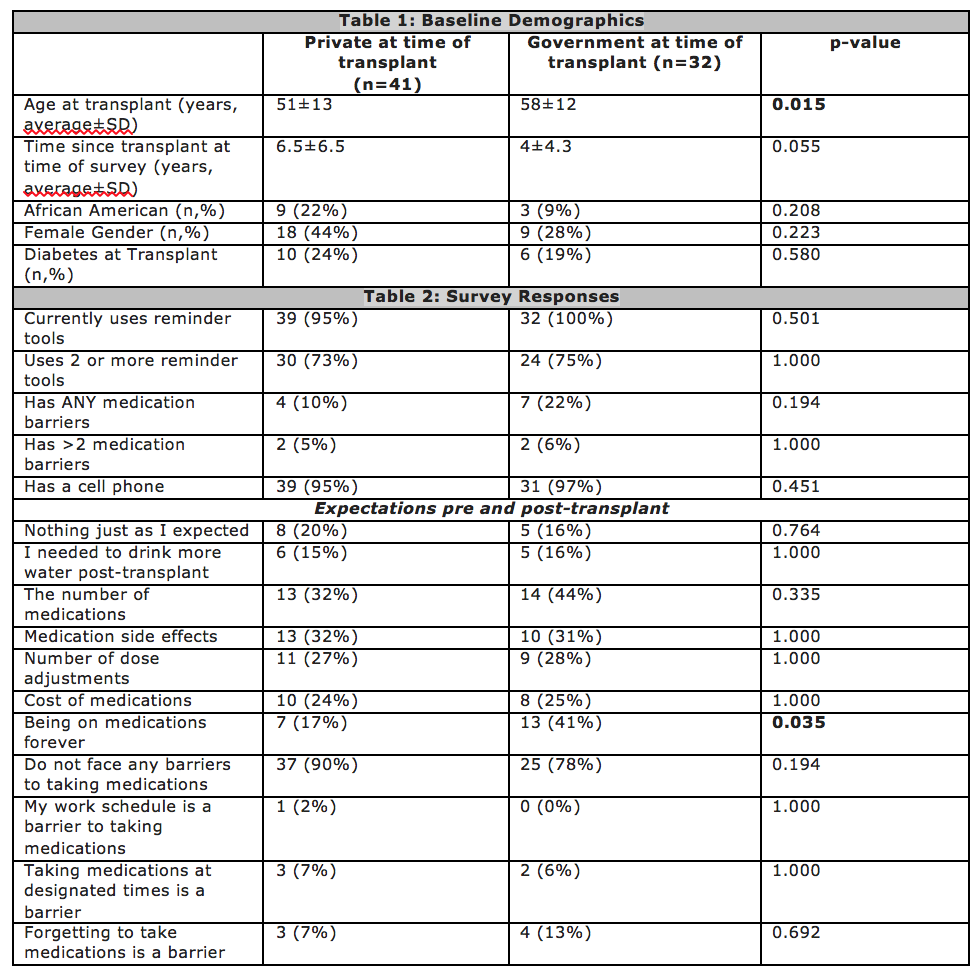Lifelong Immunosuppression, I Am Sure We Told Them That?: Long Term Medication Adherence in Liver Transplant Patients
K. Foster1, C. Perez1, T. Harrison1, H. Corbo1, N. Patel1, J. Fleming1, H. Meadows1, D. Taber1, D. DuBay2, J. McGillicuddy2, N. Pilch1
1Department of Pharmacy Services, -Medical University of South Carolina, -Charleston, SC, 2Division of Transplant Surgery, Department of Surgery, -Medical University of South Carolina, -Charleston, SC
Meeting: 2019 American Transplant Congress
Abstract number: D317
Keywords: Liver transplantation, Psychosocial
Session Information
Session Name: Poster Session D: Psychosocial and Treatment Adherence
Session Type: Poster Session
Date: Tuesday, June 4, 2019
Session Time: 6:00pm-7:00pm
 Presentation Time: 6:00pm-7:00pm
Presentation Time: 6:00pm-7:00pm
Location: Hall C & D
*Purpose: Current literature describes demographic information of non-adherent patients and identifies that non-adherence may be predictive of post-txp outcomes. We suspect that patients with private insurance (PI) are believed to be more adherent than those with government insurance (GI), but there is no data to explain the cause. The aim of this study is to identify if there are any differences in identified barriers and expectations in liver transplant (LTx) patients with PI versus GI at time of txp.
*Methods: LTx recipients 18+ years of age were surveyed about medication adherence and adverse effects commonly associated with immunosuppressants. Patients were compared based upon whether they had PI or GI at the time of LTx. The primary outcome was percentage of patients identified to have barriers. Secondary outcomes included patient baseline expectations pre- and post- LTx and medication adherence score. Descriptive statistics were used to evaluate demographics and individual survey responses.
*Results: 73 patients were surveyed between 3/2018 and 11/2018. Forty-one respondents had PI at the time of transplant. Baseline characteristics can be found in Table 1. There was no difference in barriers between patients who had PI at time of txp compared to those with GI (10% vs 22%, p=0.194, table 2). Patients who had PI were significantly more likely to expect to be on lifelong immunosuppression (17% vs 41%, p=0.035). There was no difference in number of patients with low medication adherence score between the two groups at the time of survey (17% vs 22%, p=0.768).
*Conclusions: Patients with PI had no difference in the number of barriers compared to patients with GI but were more likely to expect to be on lifelong immunosuppression. Private paying patients may have additional education support from their payors. Multimodal education methods are potentially needed to prepare patients for transplant and should be the focus of future intervention studies.
To cite this abstract in AMA style:
Foster K, Perez C, Harrison T, Corbo H, Patel N, Fleming J, Meadows H, Taber D, DuBay D, McGillicuddy J, Pilch N. Lifelong Immunosuppression, I Am Sure We Told Them That?: Long Term Medication Adherence in Liver Transplant Patients [abstract]. Am J Transplant. 2019; 19 (suppl 3). https://atcmeetingabstracts.com/abstract/lifelong-immunosuppression-i-am-sure-we-told-them-that-long-term-medication-adherence-in-liver-transplant-patients/. Accessed February 9, 2026.« Back to 2019 American Transplant Congress

